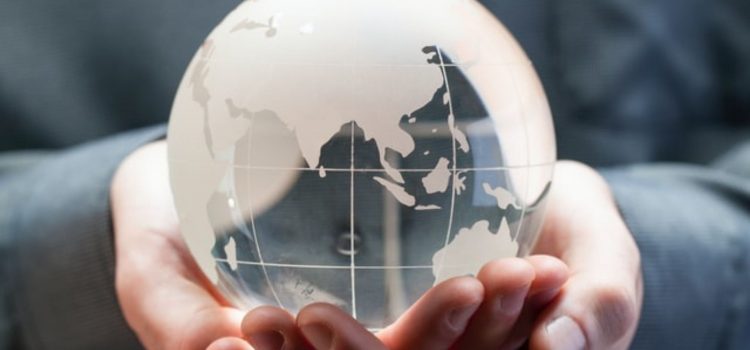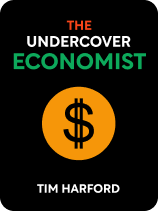

This article is an excerpt from the Shortform book guide to "The Undercover Economist" by Tim Harford. Shortform has the world's best summaries and analyses of books you should be reading.
Like this article? Sign up for a free trial here .
Is globalization good for the world’s economies? What are the main arguments that maintain that globalization is bad?
The debate as to whether globalization is good for the global economy is not a simple one—there are many factors to take into account. Principles of comparative advantage highlight the positives of globalization. But globalization still has its skeptics. Mostly, skeptics focus on the arguments that globalization is bad for the planet and for the poor.
In this article, we’ll discuss how globalization has changed the way economies function and consider two arguments against globalization: the planet argument and the poor argument.
Is Globalization Good?—The Case of the Planet
Is globalization good for our planet? People who argue that globalization is bad for the planet list the following reasons for concern:
- Globalization creates a “race to the bottom.” The companies that can produce goods the cheapest are the only ones that succeed, and it’s easier to produce cheap goods with less stringent environmental regulations.
- The act of moving goods from place to place creates more pollution. This happens more in a globalized world.
- The economic growth that comes from globalization is bad for the planet because it necessitates building more polluting factories and more consumption.
Here are the reasons why each of these arguments is misguided:
- Most trade happens between rich countries that have similar regulations on pollution. Companies are playing on an even playing field. Additionally, any additional costs that come from government regulations on pollution are generally negligible. Most of the cost of producing a good comes from the cost of labor. When companies move, they almost always do so to find cheaper labor rather than to find less stringent environmental regulations. Additionally, protectionist policies like giving government subsidies can encourage pollution. To keep foreign goods, which are manufactured more efficiently, out of a country, the government essentially pays polluters to continue polluting.
- There is nothing that is uniquely damaging to the environment about crossing a national border. It is an environmental problem that more goods move further in a globalized world, but instead of cutting movement off at borders, governments should charge externalities (discussed in Chapter 4) inside and outside of their countries.
- The deadliest environmental problems, such as unclean drinking water, actually affect the poorest people in the world the most. Economic growth can help with these problems. As people become wealthier, they no longer have to rely on unsafe drinking water. Admittedly, there are some problems, like fumes from car exhausts, that get worse as people get a bit richer. But as they get richer still, they can start to afford to buy cars that don’t cause as much pollution. The bottom line is, it’s not worth keeping people in poverty to attempt to solve the environmental crisis. Plus, it’s not a binary equation, given that there’s no need to choose between one or the other. As discussed in the last answer, we can raise externality taxes and use those taxes to work on our environmental issues.
Rather than fear free trade, environmentalists should embrace it.
The Case of the Poor
Some anti-poverty advocates argue that multinational corporations keep people poor by paying them poor wages. This is not the case; multinational corporations are not the cause of poverty. People accept work at sweatshops because they have no better options. And in fact, when there are more factories that belong to multinational companies in developing countries, wages begin to rise because of an increase in competition. Rather than chastise companies for developing in poorer nations, we should encourage this behavior.
When a group of people decides to buy only “fair trade” goods, this adversely affects sweatshop workers more than anyone else. If people buy more “fair trade” goods, then there’s less demand for the goods that sweatshop workers make, and companies can either pay them lower wages or shut down their factories. Tariffs that stop people from buying sweatshop goods only benefit some unions, who have outsized political power in many developed nations. When special interests like unions have less power, governments always lower tariffs and promote free trade.
(Shortform note: To learn more about how international trade can improve standards of living around the world, read our summary of Naked Economics.)
Case Study: Cameroon
Economists and those who live in or have an interest in Cameroon and its people are curious about the same two questions: Why is Cameroon poor? And what can we do to make it less poor? We’ll explain Cameroon’s problems and how globalization could help Cameroonians.
To answer these questions, we’ll begin with the current state of the Central African nation. Currently, Cameroon has few good roads. The roads that are paved are littered with potholes and shopkeepers who have set up their business in the middle of the street. There are no rules that govern traffic. The Cameroonian president, Paul Biya, has been in power since 1982. Amnesty International grades the country as one of the most corrupt nations in the world.
Cameroonians by and large hate their government because it doesn’t provide them with basic services. They believe that it is riddled with corruption that begins with Biya. Biya, though, does have some incentive to help the nation thrive to an extent. Even if he is purely self-interested and a complete bandit, he doesn’t steal everything from his people, because then there will be nothing to take the next year. A nation with a successful economy would lead to more profit for Biya.
The problem is, Biya is not in as much control as many of his people believe. He is the head of the government, but to stay in power, he has to please many actors—in particular the civil servants and the military below him—to stay in power. Biya might prefer that the police department, for example, solicit fewer bribes. However, he needs the backing of the police to hold onto the nation, so he has to allow their corruption to protect his own. Certainly, Biya doesn’t have the best interests of Cameroon at heart. His taxes are arbitrary and discourage investment, and he tolerates corruption from all parts of government to stay in power. But while the rife corruption comes from the top, it extends well beyond Biya.

———End of Preview———
Like what you just read? Read the rest of the world's best book summary and analysis of Tim Harford's "The Undercover Economist" at Shortform .
Here's what you'll find in our full The Undercover Economist summary :
- How to think like an economist
- How to use principles like scarcity, price targeting, the stock market, and game theory to make better decisions every day
- Why the economy is mostly about people, not complex math, graphs, or jargon






